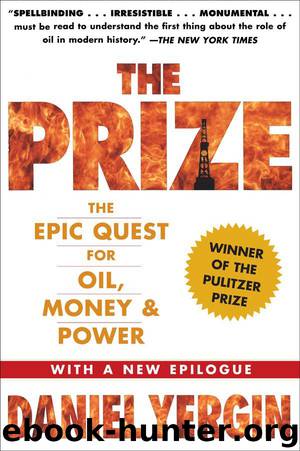The Prize by Yergin Daniel

Author:Yergin, Daniel [Yergin, Daniel]
Language: eng
Format: epub, mobi
Publisher: Simon & Schuster, Inc.
Published: 2011-04-04T22:00:00+00:00
Purgatory
Despite Ike’s reply, the anger of the U.S. government toward Britain, France, and Israel continued unabated. The message from Washington remained the same: It did not approve of the military action, and the British and French would have to stop. On November 6, Eisenhower won a landslide victory over Adlai Stevenson. That same day, the British and French agreed to a cease-fire in place; they had by then achieved only a foothold along the canal. For them, the war had lasted barely a day, and its objective, unrestricted use of the canal, had already been lost. But Washington made clear that a cease-fire was not enough. They would have to withdraw. And so would Israel, or it would face economic reprisals from Washington. Eisenhower told his own advisers that it was imperative not to “get the Arabs sore at all of us,” because they might embargo oil shipments from the entire Middle East.
Without American aid, all of Western Europe would soon be short of oil. Winter was coming, and the stock levels were only enough for several weeks. The normal route for three-quarters of Western Europe’s oil was now interrupted by the combined loss of transit through the canal and the Middle Eastern pipelines. In addition, Saudi Arabia instituted an embargo against Britain and France. In Kuwait, acts of sabotage shut down that country’s supply system. When word was brought to the British Cabinet’s Egypt Committee that the United States was considering oil sanctions against Britain and France, Harold Macmillan threw his arms up in the air. “Oil sanctions!” he said. “That finishes it.” On November 7, the British government announced that consumption would have to be cut by 10 percent. Upon entering the House of Commons, Eden was greeted with catcalls from the Labour opposition, which had flipflopped from its initial vigorous endorsement of a strong policy against Nasser. Critics in Parliament now declared that, if ration coupons were issued, they should bear a portrait of Sir Anthony Eden.
On November 9, Eisenhower met with the National Security Council to begin considering help for the Europeans. He talked about getting the oil companies to cooperate on a major supply program. “Despite my stiff-necked Attorney General,” he said with a smile, he would provide the companies with a certificate that they were operating in the interests of national security, thus protecting them from antitrust action. But what would happen if the heads of the oil companies landed in jail anyway for participating in such a program? Why, said the President, laughing, he would pardon them. But he also made emphatically clear that all this was only contingency planning. Absolutely no emergency oil supply program would be put into effect until the British and French had actually begun to withdraw from Egypt. Europeans bitterly complained that the United States was going to punish Britain and France by “keeping them in purgatory.” The international oil companies, seeing shortages develop, begged the Eisenhower Administration to activate the Middle East Emergency Committee. But, as one oil company executive put it, “The Administration simply refused.
Download
This site does not store any files on its server. We only index and link to content provided by other sites. Please contact the content providers to delete copyright contents if any and email us, we'll remove relevant links or contents immediately.
| Arms Control | Diplomacy |
| Security | Trades & Tariffs |
| Treaties | African |
| Asian | Australian & Oceanian |
| Canadian | Caribbean & Latin American |
| European | Middle Eastern |
| Russian & Former Soviet Union |
The Secret History by Donna Tartt(19088)
The Social Justice Warrior Handbook by Lisa De Pasquale(12190)
Thirteen Reasons Why by Jay Asher(8910)
This Is How You Lose Her by Junot Diaz(6887)
Weapons of Math Destruction by Cathy O'Neil(6280)
Zero to One by Peter Thiel(5802)
Beartown by Fredrik Backman(5754)
The Myth of the Strong Leader by Archie Brown(5507)
The Fire Next Time by James Baldwin(5446)
How Democracies Die by Steven Levitsky & Daniel Ziblatt(5219)
Promise Me, Dad by Joe Biden(5153)
Stone's Rules by Roger Stone(5088)
A Higher Loyalty: Truth, Lies, and Leadership by James Comey(4964)
100 Deadly Skills by Clint Emerson(4925)
Rise and Kill First by Ronen Bergman(4789)
Secrecy World by Jake Bernstein(4753)
The David Icke Guide to the Global Conspiracy (and how to end it) by David Icke(4720)
The Farm by Tom Rob Smith(4512)
The Doomsday Machine by Daniel Ellsberg(4490)
